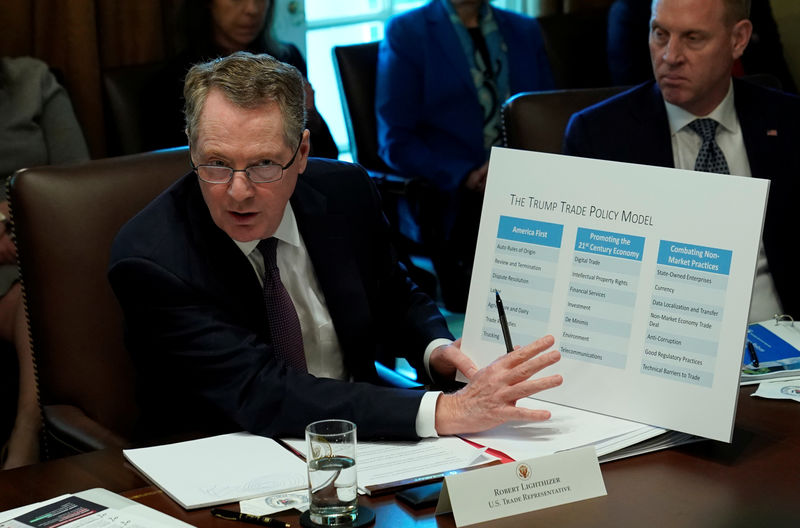By Humeyra Pamuk
WASHINGTON (Reuters) - United States Trade Representative Robert Lighthizer did not see any progress made on structural issues during trade talks with China last week, Republican U.S. Senator Chuck Grassley said on Tuesday.
Grassley, who held a meeting with Lighthizer on Friday, said the top trade negotiator commented very positively on China's soybean purchases, which resumed in modest amounts last month after Washington and Beijing agreed to a 90-day truce in a trade war that has disrupted the flow of hundreds of billions of dollars of goods.
"But he (Lighthizer) said that there hasn't been any progress made on structural changes that need to be made," Grassley said in his weekly conference call with reporters, adding that those issues would include intellectual property, stealing trade secrets and putting pressure on corporations to share information.
The meeting came after mid-level U.S. and Chinese officials met in Beijing to discuss China's offers to address U.S. complaints about intellectual property theft and increase purchases of U.S. goods and services. The two sides are trying to reach a deal that avoids a scheduled March 2 escalation of U.S. tariffs on $200 billion worth of Chinese goods.
Grassley said Chinese officials were due to visit Washington for further trade talks in a couple of weeks. "From my point of view ... the economy of China is suffering ... there is a chance for progress," he said.
A USTR spokesman could not be immediately reached for comment on Grassley's remarks to reporters. The news briefly tempered U.S. stock market sentiment.
U.S. officials expect China's top trade negotiator may visit Washington this month, signalling that higher-level discussions are likely to follow last week's talks with mid-level officials in Beijing.
Halfway through a 90-day truce in the U.S.-China trade war agreed to on Dec. 1 when Trump and Chinese President Xi Jinping met at the G20 summit in Argentina, there have been few details provided of any progress made.
But China has purchased around 5 million tonnes of U.S. soybeans from the 2018 harvest so far. China in 2017 had booked more than 23 million tonnes of U.S. soy, according to U.S. Department of Agriculture data.
China last week during the talks also approved five genetically modified U.S. crops for import, a move that could boost U.S. grain sales to China.
Trump has vowed to increase tariffs to 25 percent from 10 percent on $200 billion worth of Chinese imports on March 2 unless China takes steps to protect U.S. intellectual property, end policies that force American companies to turn over technology to a Chinese partner, allow more market access for U.S. businesses and reduce other non-tariff barriers to American products.
The timeline is seen as ambitious, but the resumption of face-to-face negotiations has bolstered hopes of a deal.

China has repeatedly played down complaints about intellectual property abuses, and has rejected accusations that foreign companies face forced technology transfers.